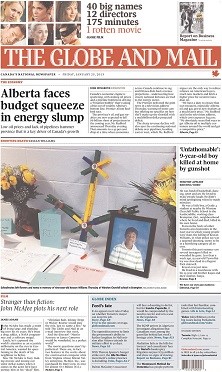
The Globe and Mail is a Canadian newspaper printed in five cities in western and central Canada. With a weekly readership of approximately 2 million in 2015, it is Canada's most widely read newspaper on weekdays and Saturdays, although it falls slightly behind the Toronto Star in overall weekly circulation because the Star publishes a Sunday edition, whereas the Globe does not. The Globe and Mail is regarded by some as Canada's "newspaper of record".
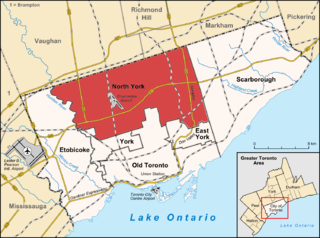
North York is a former township and city and is now one of the six administrative districts of Toronto, Ontario, Canada. It is located in the northern area of Toronto, centred around Yonge Street, north of Ontario Highway 401. It is bounded by York Region to the north at Steeles Avenue, on the west by the Humber River, on the east by Victoria Park Avenue. Its southern boundary corresponds to the northern boundaries of the former municipalities of Toronto: York, Old Toronto and East York. As of the 2016 Census, the district has a population of 644,685.
The Communist Party of Canada (Ontario) (French: Parti communiste du Canada (Ontario)) is the Ontario provincial wing of the Communist Party of Canada. Using the name Labor-Progressive Party from 1943 until 1959, the group won two seats in the Legislative Assembly of Ontario: A.A. MacLeod and J.B. Salsberg were elected in the 1943 provincial election as "Labour" candidates but took their seats as members of the Labor-Progressive Party, which the banned Communist Party launched as its public face in a convention held on August 21 and 22, 1943, shortly after both the August 4 provincial election and the August 7 election of Communist Fred Rose to the House of Commons in a Montreal by-election.
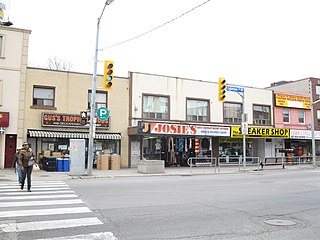
York is a district and former city within Toronto, Ontario, Canada. It is located northwest of Old Toronto, southwest of North York and east of Etobicoke, where it is bounded by the Humber River.

The media in Toronto encompasses a wide range of television and radio stations, as well as digital and print media outlets. These media platforms either service the entire city or are cater to a specific neighbourhood or community within Toronto. Additionally, several media outlets from Toronto extend their services to cover the Greater Toronto Area and the Golden Horseshoe region. While most media outlets in Toronto cater to local or regional audiences, there are also several national media outlets based in the city that distribute their services across Canada and caters to a national audience.

James "Jimmie" Simpson was a British-Canadian trade unionist, printer, journalist and left-wing politician in Toronto, Ontario. He was a longtime member of Toronto's city council and served as Mayor of Toronto in 1935, the first member of the Cooperative Commonwealth Federation to serve in that capacity. He was also a member of the Orange Order in Canada.
William Henry Wright was a Canadian prospector.
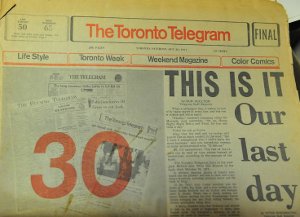
The Toronto Evening Telegram was a conservative, broadsheet afternoon newspaper published in Toronto from 1876 to 1971. It had a reputation for supporting the Conservative Party at the federal and the provincial levels. The paper competed with a newspaper supporting the Liberal Party of Ontario: The Toronto Star. The Telegram strongly supported Canada's connection with the United Kingdom and the rest of the British Empire as late as the 1960s.
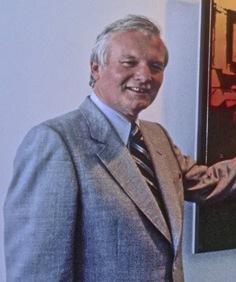
The 1975 Ontario general election was held on September 18, 1975, to elect the 125 members of the 30th Legislative Assembly of Ontario of the Province of Ontario, Canada.

The Globe was a newspaper in Toronto, Ontario, Canada, founded in 1844 by George Brown as a Reform voice. It merged with The Mail and Empire in 1936 to form The Globe and Mail.
The Empire was a newspaper established in Toronto, Ontario, Canada, in 1887. Founded by John A. Macdonald, the Prime Minister of Canada and publishing rival of George Brown of The Globe, it was the voice of the conservatives in the city. Macdonald and Brown had been political rivals in Canada West. The Empire was founded when the previous conservative paper in Toronto, The Toronto Mail, declared independence of any political party in 1886.

The Toronto Mail was a newspaper in Toronto, Ontario which through corporate mergers became first The Mail and Empire, and then The Globe and Mail.

Michael James Rodden was a Canadian sports journalist, National Hockey League referee, and Canadian football coach, and was the first person elected to both the Hockey Hall of Fame (1962) and the Canadian Football Hall of Fame (1964).
David Creighton was an Ontario businessman and political figure. He represented Grey North in the Legislative Assembly of Ontario from 1875 to 1890 as a Conservative member.

Clement George McCullagh was an influential Canadian newspaper owner between 1936 and 1952. He created The Globe and Mail by merging the Liberal-allied Globe and Conservative-allied Mail and Empire newspapers in 1936. He was also actively involved in Canadian politics and later owned the Toronto Telegram newspaper.
Christopher William Bunting was an Irish-born politician, merchant, newspaper owner and newspaper publisher.

There were five important periods in the history of Canadian newspapers' responsible for the eventual development of the modern newspaper. These are the "Transplant Period" from 1750 to 1800, when printing and newspapers initially came to Canada as publications of government news and proclamations; followed by the "Partisan Period from 1800–1850," when individual printers and editors played a growing role in politics. The "Nation Building Period from 1850–1900," when Canadian editors began the work of establishing a common nationalistic view of Canadian society. The "Modern period" from 1900 to 1980s saw the professionalization of the industry and the growth of chains. "Current history" since the 1990s saw outside interests take over the chains, as they faced new competition from the Internet.

John Harold Boyd, also referred to as John Boyd Jr. was a Canadian photographer for The Globe and Mail, based in Toronto, Ontario. He was also a founding member and early president of the Commercial and Press Photographers' Association of Canada.
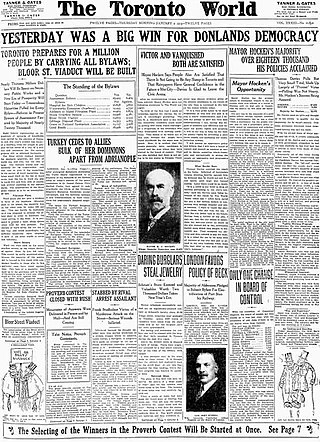
The Toronto World was a newspaper based in Toronto, Ontario, Canada. It existed between 1880 and 1921, and a Sunday edition operated from 1891 to 1924. Founded by William Findlay "Billy" Maclean, it was popular among Toronto's working class and similar in style to The New York Herald. It was said to be the "editorially boldest" of the Toronto press, and was notable for its irreverence, noisy exposés of civic corruption, skilful skirting of the libel laws, and opposition to the religious establishment. Journalists such as Hector Charlesworth, Joseph E. Atkinson and John Bayne Maclean first worked there, before moving on to senior positions at other publications.













